Posted: 2nd September 2021
Commercial Waste Guide for UK Businesses
Disposing of business waste is a basic part of your company's day-to-day operations. In this guide, you'll learn about the different types of business waste and your legal and environmental responsibilities as a company. With Simpler Recycling legislation in April 2025, commercial waste laws are getting even stricter.
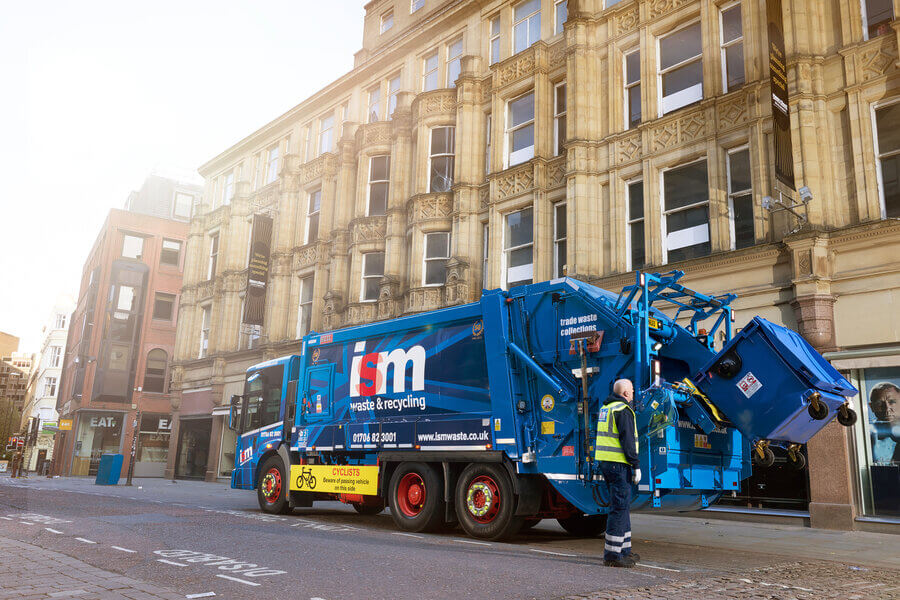
What is Business Waste?
Business waste is a broad term that covers all waste materials produced by a company or commercial activity.
The types of rubbish produced by businesses can vary greatly, and for every kind of waste, the rules on disposal and treatment can be very different.
Every business creates some waste, no matter the company's size, so it's essential to understand what you need to do about it.
Business waste includes waste that comes from:
- Industry
- Construction
- Demolition
- Agriculture
Types of Business Waste
Commercial waste is split up into different categories to make sure that your waste is dealt with in the right way.
A lot of what you may think is rubbish is actually recyclable, and we all know the importance of recycling these days.
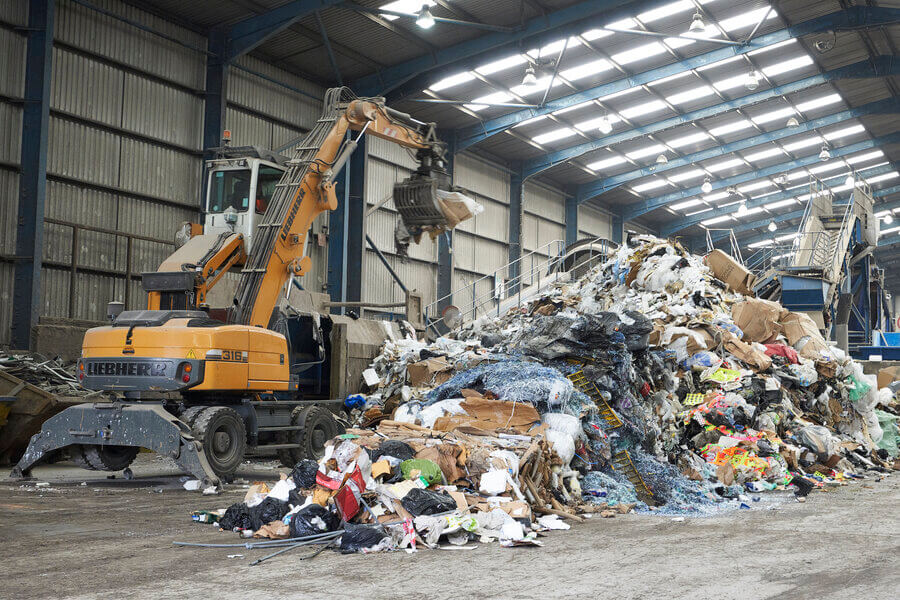
Here are the main categories of UK commercial waste:
General Waste
General waste is the common everyday rubbish produced in the workplace that unfortunately can't be recycled.
This one is easy; it's pretty much the same stuff you would put in your household general waste bin.
Almost all businesses will produce this type of waste, no matter the industry.
Dry Mixed Recycling
Dry mixed recycling are some of the most common recyclables produced by businesses, but luckily, as it says in the name, it's recyclable.
Examples of mixed recyclables include paper, plastic bottles, tins and cardboard.
To ensure recycling rates for your businesses is as high as possible, you will usually need a specific bin just for your dry mixed recycling to prevent it from getting contaminated.
Glass Waste
Glass waste is the rubbish created by businesses where the primary material is made from glass. Examples include glass bottles, drinks bottles, and broken drinking glasses.
The hospitality sector, such as pubs and restaurants, require glass bins. Glass, in small amounts, can go in your dry mixed recycling bins, but for the hospitality sector, it usually makes sense to have a dedicated glass bin.
Hazardous Waste
Hazardous waste is where it starts to get a bit more complicated, and extra care is needed for these types of materials. It is defined as any waste product that can cause harm to people or the environment, which can be a lot of different kinds of waste, more than you may realise.
Hazardous waste is found in the majority of businesses. Examples include asbestos, chemicals, batteries, solvents, oils (except food oils) and WEEE goods.
Confidential Waste
Confidential waste is all kinds of documents that include personal and private information about an individual or a company.
This includes personal files, financial records, health documents, social care records and criminal records.
Common examples in businesses and organisations include CVs, job applications, letters, invoices, bills, bank statements and health records.
If you breach GDPR, your company can be fined up to 4% of your annual turnover, or €20 million (£17.5 million), whichever is greater.
Food Waste
Food waste is any food product that has not been consumed entirely and discarded, which is pretty hard to avoid. So, no matter what the nature of your business is, the chances are that you will need some kind of food waste management.
From offices with canteens to shops and restaurants and the broader hospitality sectors, food waste is mostly unavoidable.
By segregating your food into a dedicated collection, you'll be reducing the environmental impact of your business to help meet your environmental and sustainability goals.
Clinical Waste
Clinical waste is a term that covers many different waste types, with some requiring specialist collections and treatment.
Clinical waste is a broad term that covers many different waste types. Essentially, clinical waste includes items contaminated with blood or body fluids, tissue (animal or human), syringes, sharps, pharmaceutical products and PPE.
Why is Commercial Waste Management Important?
Every registered business in the UK produces waste which means you'll need your waste managed by a licenced and insured waste management company.
Not only is professional waste management good for the environment, but it's also your legal responsibility to make sure that a licenced waste management company deals with your waste.
Whether you're a small, medium or large business, you must ensure that your waste is stored, removed and disposed of according to UK waste management regulations and laws.
Waste offences under the Environment Protection Act 1990 can result in you or your business being fined.
Waste Duty of Care Code of Practice
Duty of Care (Section 34 of the Environment Protection Act 1990) is the legislation that outlines how companies should dispose of their business waste responsibly.
The main purpose of the waste duty of care is to make sure that your waste is managed safely to protect human health and the environment.
It states the following:
- Store waste safely and securely
- Prevent the waste from causing damage to human health and the environment
- Ensure that your waste management company is licensed
- Complete waste transfer notes for all waste
- Follow the waste hierarchy
Waste Transfer Note (WTN)
Waste Transfer Notes are legally required documents for businesses in the UK and are an important way to track your waste from your business to its final destination.
No matter the business type, you will need to prove that you legally dispose of your rubbish. You'll also need to keep records of all waste transfer notes for at least two years (and three years for hazardous waste consignment notes).
Waste transfer notes sound like they are a lot of hassle, but when using a waste management company such as ourselves, we will take care of all the documentation.
Environmental Impact & Recycling
Recycling is essential for the environment and your business. A lot of the waste we produce here in the UK is now recyclable, and we need to recycle as much as possible.
We all know how much of a difference doing your bit in terms of recycling is but did you know recycling is a much more cost-effective method of dealing with waste.
Landfill tax in the UK continues to rise every year. Right now, in 2024, landfill tax is priced at £103.70 per tonne! No one wants to pay that to get rid of waste, so that's where recycling comes in.
| Rate | Tax (per tonne) |
|---|
| Standard Rate | £102.10 |
| Lower Rate | £3.30 |
For example, here at ISM Waste & Recycling, we divert over 90% of waste away from landfill disposal by recycling and refuse-derived fuel, making for pretty significant savings.
Bins, Skips and Waste Containers
Wheelie Bins (Euro Bins)
Wheelie bins are popular for many different businesses, including hospitality, manufacturing and production firms, office-based companies, and retail companies.
You can use wheelie bins for a wide range of waste types including, general waste, dry mixed recycling, glass waste, and food waste, with daily, weekly, and fortnightly collections available.
Typical wheelie bins sizes include 240 litre bins, 660 litre bins and 1100 litre bins.
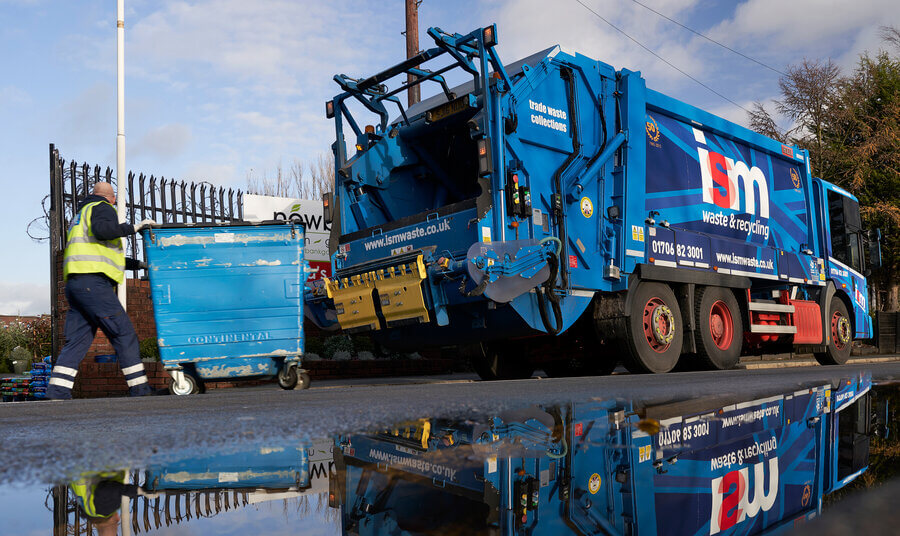
Traditional Skips
Skip hire is ideal for heavy and bulky waste for all types of commercial waste removal needs such as construction work, shop fitting or office and building clearances.
The standard skip sizes in the UK include 4yd³, 6yd³, 8yd³, 10yd³, 12yd³, 14yd³ and 16yd³.
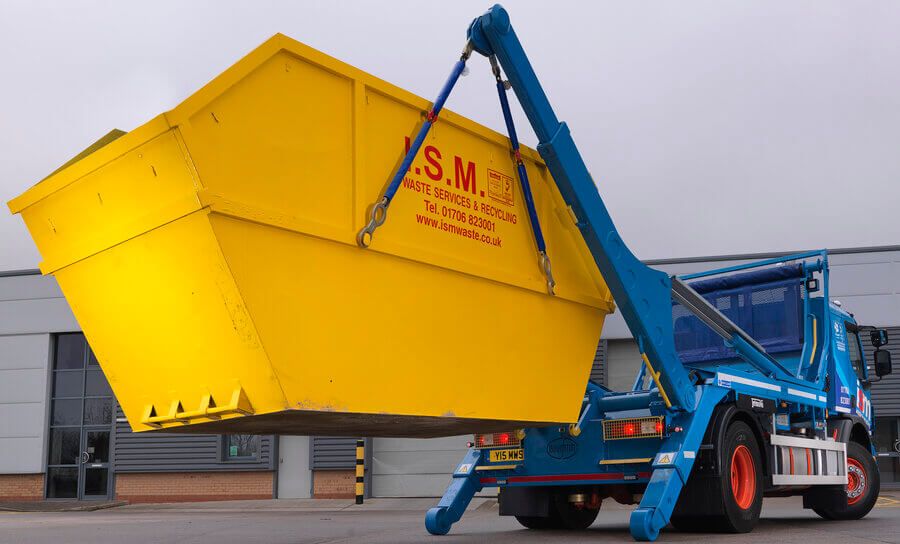
Rear End Loading Skips
Rear end loading skips are a popular choice due to the range of applications. Ideal for most waste types, including general waste, dry mixed recycling, paper and cardboard and confidential documents.
Rear end loading skip sizes include 8yd³, 10yd³, 12yd³, 14yd³ and 16yd³. You can choose either lidded or open skips, but this usually depends on what type of waste will be going in the skip.
For example, dry mixed recycling will require a lidded skip. Similarly to wheelie bins, REL skips will be on a daily, weekly, and fortnightly collection schedule.
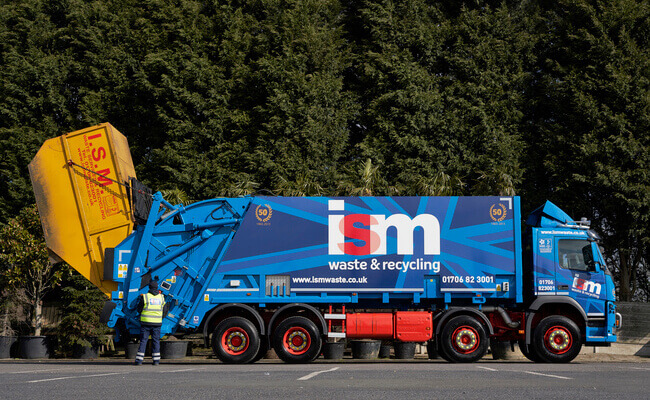
Roll On Roll Off Skips
Roll on roll off skips are the largest skips available and are ideal for reducing waste disposal costs for companies that produce large quantities of commercial, industrial and trade waste.
The most common roll on roll off skip sizes include 25yd³, 35yd³ and 40yd³. Waste compactors can be fitted to enclosed RORO containers for waste that can be compacted such as dry mixed recycling and general waste.
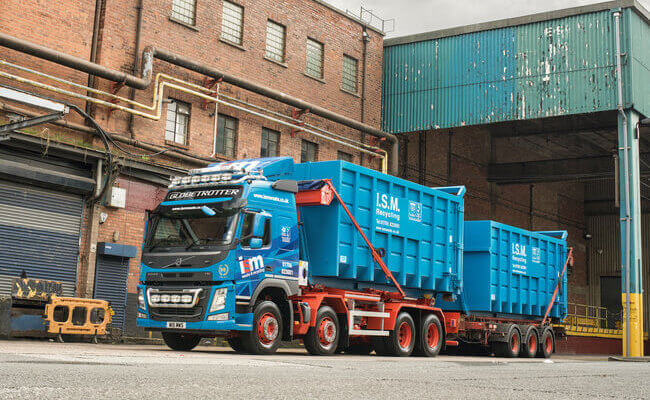
What is a Waste Audit and Why You Need One?
Every business is different, which means no two firms produce the same types and amounts of waste. Because of this, it is important to find out exactly which disposal and recycling services work for you, so you're never overpaying for your waste.
Essentially, the point of a waste audit is to identify the types and amounts of waste that your business produces, so you're only getting the specific services that suit your business's needs.
Ready to Get Started?
Here at ISM Waste & Recycling, we are a fully licenced and environmentally responsible waste management company. We believe in providing the most reliable waste management services at affordable prices for all of our customers.
It's quick and easy to get started with one of our no-obligation waste audits, just one of the many reasons to choose us as your waste management and recycling provider. We cover all areas across Greater Manchester and Lancashire including Bury, Bolton, Blakburn, Manchester, Trafford, Oldham, Rochdale and many more areas. Call us on 01706823001 or fill in our simple contact form.
Useful Links: